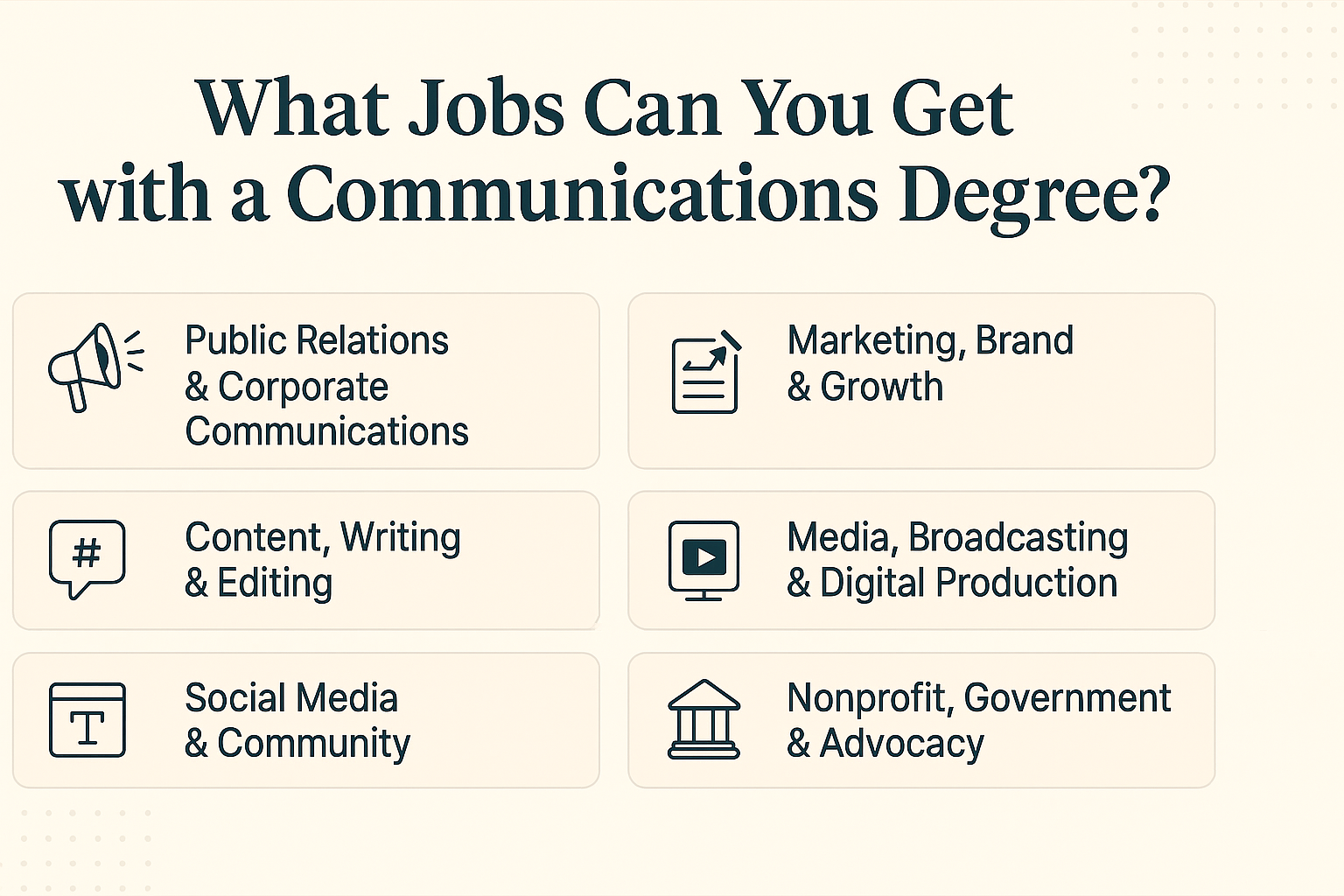What Can You Do with a Communications Degree?
A communications degree opens doors to a wide range of industries, including marketing and media, public relations, internal communications, and user experience writing. Because communication is a universal skill, graduates find opportunities in nearly every sector.
The field is broad but steady in demand. Media and communication professionals continue to see consistent hiring, driven by the need for clear messaging, storytelling, and digital content management across organizations.
Transferable Skills Employers Want
A communications degree gives you practical, marketable skills employers love, such as:
- Strategic storytelling and message framing
- Writing, editing, and content clarity
- Research and audience analysis
- Verbal and nonverbal presentation skills
- Social media and content strategy
- Campaign and performance analysis
- Collaboration across teams like marketing, sales, and HR
These are the skills that make communications graduates adaptable and valuable in fast-moving workplaces.
Core Career Paths for Communications Majors
Public Relations and Corporate Communications
Typical roles: PR specialist, corporate communications associate, media relations coordinator.
What you’ll do: Manage brand reputation, craft press releases, coordinate with media, and handle crisis communication.
Salary range: Around $60,000–$75,000, depending on experience and industry.
What you’ll do: Manage brand reputation, craft press releases, coordinate with media, and handle crisis communication.
Salary range: Around $60,000–$75,000, depending on experience and industry.
Marketing, Brand, and Growth
Roles: marketing coordinator, brand strategist, product marketing manager.
Work: Develop campaigns, manage budgets, analyze performance metrics, and align messaging with brand goals.
Why it fits: Communications grads excel at persuasive storytelling and audience engagement.
Work: Develop campaigns, manage budgets, analyze performance metrics, and align messaging with brand goals.
Why it fits: Communications grads excel at persuasive storytelling and audience engagement.
Content, Writing, and Editing
Roles: content strategist, copywriter, technical writer, editor.
Work: Produce blogs, landing pages, articles, or internal materials that educate and convert.
Tip: Create a writing portfolio that showcases SEO-optimized samples and clear results.
Work: Produce blogs, landing pages, articles, or internal materials that educate and convert.
Tip: Create a writing portfolio that showcases SEO-optimized samples and clear results.
Media, Broadcasting, and Digital Production
Roles: journalist, video producer, podcast creator, editor.
Work: Create engaging multimedia content across platforms.
Outlook: Demand remains stable, especially in digital-first and streaming media sectors.
Work: Create engaging multimedia content across platforms.
Outlook: Demand remains stable, especially in digital-first and streaming media sectors.
Social Media and Community Management
Roles: social media manager, community strategist, influencer partnerships coordinator.
Work: Build online communities, manage campaigns, track engagement metrics, and collaborate with creators.
Work: Build online communities, manage campaigns, track engagement metrics, and collaborate with creators.
UX Writing and Product Content
Roles: UX writer, content designer, conversation designer.
Work: Write microcopy for apps and products, helping users navigate experiences seamlessly.
Why it fits: Clear, empathetic communication is the foundation of user experience.
Work: Write microcopy for apps and products, helping users navigate experiences seamlessly.
Why it fits: Clear, empathetic communication is the foundation of user experience.
Internal Communications and People Operations
Roles: internal communications specialist, change management coordinator, employer brand strategist.
Work: Improve employee engagement, craft company-wide updates, and support leadership messaging.
Work: Improve employee engagement, craft company-wide updates, and support leadership messaging.
Nonprofit, Government, and Advocacy
Roles: communications officer, public affairs associate, grant writer.
Work: Handle outreach, storytelling, policy communication, and donor relations.
Tip: Volunteering or interning with nonprofits helps you build mission-driven experience.
Work: Handle outreach, storytelling, policy communication, and donor relations.
Tip: Volunteering or interning with nonprofits helps you build mission-driven experience.
Emerging and Niche Career Paths
- Corporate affairs and ESG communications
- Creator economy and influencer management
- AI content strategy and governance
- Healthcare and education communication roles
These growing niches reward adaptability and specialized communication expertise.
Entry-Level Job Titles for Communications Majors
- Communications assistant or coordinator
- PR assistant or media relations associate
- Marketing coordinator or growth associate
- Social media specialist or community associate
- Editorial assistant or copywriter
- Content marketing associate
- Event coordinator or outreach specialist
- Internal communications assistant
These titles are your first step toward senior positions, such as communications manager, brand director, or head of PR.
How to Make Your Communications Degree Pay Off
1. Build a results-focused portfolio
Show evidence of impact, published articles, social media growth, press coverage, or successful campaigns.
Show evidence of impact, published articles, social media growth, press coverage, or successful campaigns.
2. Earn relevant certifications
Short online courses in Google Analytics, HubSpot, or Meta Ads help boost credibility.
Short online courses in Google Analytics, HubSpot, or Meta Ads help boost credibility.
3. Get experience early
Internships, freelance work, or nonprofit volunteering give you tangible experience before graduation.
Internships, freelance work, or nonprofit volunteering give you tangible experience before graduation.
4. Learn basic analytics
Understanding campaign metrics and conversion data makes you more competitive.
Understanding campaign metrics and conversion data makes you more competitive.
5. Network strategically
Connect with industry professionals, join LinkedIn groups, and stay informed about communication trends.
Connect with industry professionals, join LinkedIn groups, and stay informed about communication trends.
FAQs
Is a communications degree worth it?
Yes. With the right experience and a strong portfolio, communications majors earn competitive salaries and enjoy flexible career options across industries.
Yes. With the right experience and a strong portfolio, communications majors earn competitive salaries and enjoy flexible career options across industries.
What’s the job outlook?
The overall communications field continues to grow steadily, with thousands of openings annually in marketing, PR, and content creation.
The overall communications field continues to grow steadily, with thousands of openings annually in marketing, PR, and content creation.
What entry-level roles are best?
Start as a communications assistant, marketing coordinator, or social media associate to gain cross-functional exposure.
Start as a communications assistant, marketing coordinator, or social media associate to gain cross-functional exposure.






